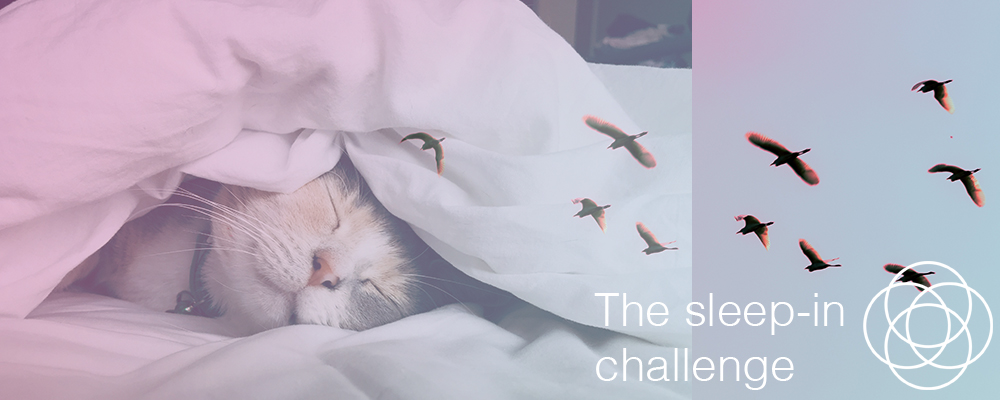How much dreaming time do you lose by sleeping six hours instead of eight?
Go on, have a guess, or work it out based on everything you know about sleep and dreaming so far.
Since as long as I can remember, I’ve always needed lots of sleep, and generally fall asleep within minutes of closing my eyes for the night. It’s very rare for me to lay awake at night, and for this, I am deeply grateful. My mother would tell you that as a baby I cried most nights, sleeping very little, and robbing her of good sleep too. In the end she went with the advice of the times and left me alone to cry it out. While I didn’t take that approach with my own babies, and zombied through my fair share of night time soothing and exhausting sleep deprivation, I wonder if Mum’s approach set me up for learning to just get on with it, to fall asleep and stay asleep because no-one was going to come no matter how much I cried. I’m certainly not advocating a return to letting babies cry it out, and thankfully there are many excellent resources and programs available to help new parents today find loving and effective ways of soothing their babies while training them to sleep, but if my ability to sleep so solidly is an outcome I can pin to my early years, I am thankful for that.
How much sleep do you get most nights? Do you get by on six hours a night? Or less?
Did you work out that sleeping six hours instead of eight would mean losing 25% of dreaming time? While that might seem logical, it’s not true.
Given that dreaming is necessary for our physiological, emotional, and mental health, a loss of 25% dreaming time would be bad enough, but in fact you lose far more.
Most – but not all – of our dreams occur during the REM phases of sleep, and the last couple of hours of an eight-hour sleep are very rich in REM, so rich that if you only sleep six hours instead of eight, you lose 60-90% of your dreaming time.
Oh, and by the way, science has shown that eight hours is the natural amount of sleep people need. If you are sleeping less than eight hours, or if your sleep is fitful or broken by nightmares leaving you anxious about getting back to sleep, or if you’re simply awake for long periods or suffering insomnia, you are missing out on more than sleep. You are missing out on nature’s nightly quota of dreaming time, which means you are missing out on the health benefits of dreaming, whether or not you remember your dreams.
Missing out on the health benefits of full dreaming time is one thing, but if you’re getting less than eight hours sleep you’re also missing the opportunity to interpret and work with a full platter of dreams. During one night’s sleep, the dreaming mind and brain will often process the same experience or issue from several different angles, dream after dream, searching for perspective or a solution. In a shorter sleep, you may miss the most significant dreams, the ones that come with early morning light, those that potentially put a night’s worth of puzzling together.
So here’s your sleep-in challenge:
Maybe your life is so packed and busy that you feel stuck with getting by with less than eight hours sleep every night. Or maybe you’re parenting a baby and even a solid five-hour sleep sounds like heaven. Or maybe you’re saddled with insomnia, and getting any sleep over a few hours seems impossible. Or maybe you suffer from nightmare anxiety (which can be overcome by understanding your nightmares and doing dream alchemy exercises).
Or maybe none of these are true, and you know that you can, just for one week, go to bed early enough, or sleep in long enough, to clock up eight hours sleep for seven days in a row.
Or maybe that feels too big, but one night a week sounds doable.
Start where you can. Make yourself a promise.
Then, even if you normally write down your dreams, buy a new notebook or journal with the intention of recording your eight-hour sleep dreams. Or even just recording the last dream of each eight-hour sleep. Maybe decorate the cover with a big number 8. Place it beside your bed each night that you intend to sleep in to reach those eight hours. In the morning write down your dreams, or, if your dreams float away on the morning light, write down any fleeting memories or feelings from the night.
If you wake up after your usual six or seven hours, and feel ready to get up, don’t! Close your eyes and drift, or, if your bladder has pressing urgencies, get up, go to the loo, then climb back into bed. Suitably relieved, you are very likely to fall into another round of dreaming. Just close your eyes and surrender to the possibility of drifting into dream.
Take the sleep-in challenge and note the differences: do you feel more refreshed in the mornings? Do you feel calmer, more balanced, and with a greater sense of perspective? Are the dreams you gather from the extra sleep different in context or quality than dreams you have earlier in your sleep? If you know how to work with your dreams, do the insights you reap from your extra hours sleep-in dreams have extra value?
Though you may think that cutting one or two hours from your waking life is a loss, be prepared for a surprise. That extra sleep and dreaming time – well, not really extra sleep, sleep as nature intends it – can add more efficiency and magic to your days. Try it, and see.


2 comments on “The sleep-in challenge”